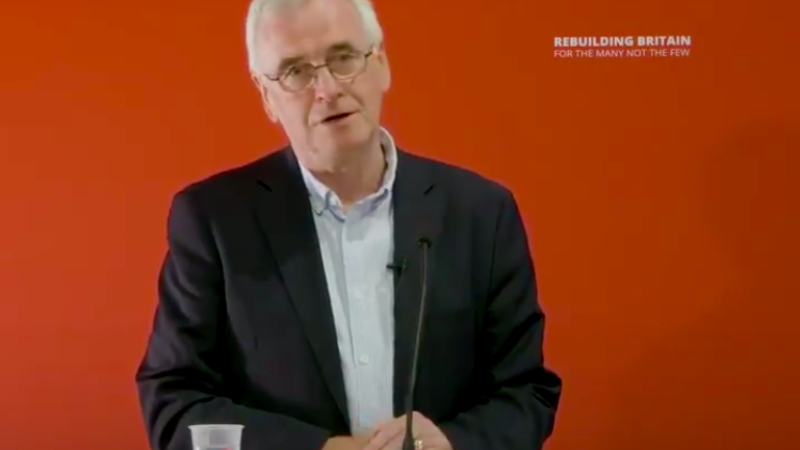
Over the weekend, John McDonnell hosted an impressive set of international academics, politicians and activists at SOAS University in London to discuss the global economic framework under the banner of a new International Social Forum. Clearly taking inspiration from the World Social Forum, first hosted in Brazil in 2001 to create a counter-narrative to the World Economic Forum and discuss the global economic order through the lens of social issues and equality, the Shadow Chancellor kickstarted a new dialogue on peace, solidarity and justice in the international framework that governs world trade.
Guests included high-profile speakers such as the former President of Brazil, Dilma Rousseff, and Greek economist Yanis Varoufakis. Political campaigners and researchers from the Global South such as Naledi Chirwa (Economic Freedom Fighters’ representative in the South African National Assembly), Jayati Ghosh (Jawaharlal Nehru University, New Delhi) and Gyekye Tanoh (Third World Network-Africa) shone light on issues of international development, global financial institutions and free trade from a perspective too rarely platformed in mainstream discussions in Britain and the Global North.
The overarching message promoted during the day rested on the reckoning with the consequences of colonialism and its enduring legacy on the global economic order. The event joined the dots between multinational corporations’ desire to extract wealth and accumulate profits regardless of the consequences for our planet, the continued economic exploitation of the Global South, the resulting climate change and migration.
For example, if we look at the way many goods are produced, we will often find that raw materials are extracted by Western-owned multinational companies in the Global South. These primary commodities are then processed in plants or factories in the Global North, including in Britain. Companies sell back these goods to customers in the Global South at inflated prices. The problem here is as follows: whilst the primary commodity comes from the Global South, the ownership of the means of production firmly rest elsewhere. Even though countries in the Global South are rich on resources, they see little of the profits and employment opportunities that they bring.
This is the fundamental logic of an imperialist economy. Back in the days of Empire, colonies were plundered for raw materials as Britain built its wealth and industrialised at a scale that was disproportionate to other countries. The standard of living we enjoy today is linked to this historical exploitation.
The global trading framework still resembles this mindset. The World Bank, the International Monetary Fund, the OECD and other such organisations reinforce a system that means power is situated in the Global North whilst the power of the people in the Global South is purposefully oppressed.
Another cornerstone of McDonnell’s social forum was climate change. Politicians speak of the need to change environmental policies and promote sustainability here with a view to achieve some results in a couple of decades’ time. But in the Global South, the consequences of climate change are being felt harshly already. People are forced to leave their home due to extreme weather, floods and draughts that – combined with commodity speculation – threaten food security and ultimately can fuel violent conflict.
As centre-right governments across Europe have eroded the social fabric of our communities, a space has opened that leaves room for the far right to step through. Austerity policies have led to communities feeling frustrated and angry. Now the far right is linking these feelings of frustration with a defence of the nation and “our culture” against the threat of the other. The political response to this is more borders – and specifically, more violent borders.
We only have to look to the Mediterranean to see the consequences of climate change, a fundamentally colonial international economic set-up and a xenophobic defence of the nation state. And this system works in the interest of capitalism: workers who do not recognise their international counterparts as brothers and sisters in the struggle will find it hard to organise in a global order that requires globally coordinated action.
Of course, bosses are more than happy to use migrant workers if economic conditions demand it, for example if there is a sudden boom in an industry where there is a shortage of readily available workers. The crucial difference is that they reject that people who come here to work should also be awarded citizens’ rights – the right to a family life, access to healthcare and welfare benefits. They want workers they can easily dispose of when capital does not need them again.
Left-wing movements must break this circle. The power that rests with global capitalism can only be broken if we organise globally too. Workers solidarity cannot be viewed through the national lens of better pay and conditions here. Transnational collective bargaining, as suggested by Yanis Varoufakis in his closing speech, is a step in this direction. Trade unions must organise along the supply chain of multinational companies and foster solidarity between all its workers along the way.
Internationally, the far right is getting organised. The likes of Nigel Farage, Marine Le Pen, Boris Johnson, Donald Trump and Jair Bolsonaro in Brazil are promoting right-wing economic policies married with social conservatism, which targets women, migrants and minority communities and LGBT+ people. The progressive left only has a chance if we organise internationally too. This initiative by McDonnell was a good and important start towards a coordinated fightback based on a deeper understanding of the root causes of global inequality and international solidarity.




More from LabourList
‘What Batley and Spen taught me about standing up to divisive politics’
‘Security in the 21st century means more than just defence’
‘Better the devil you know’: what Gorton and Denton voters say about by-election